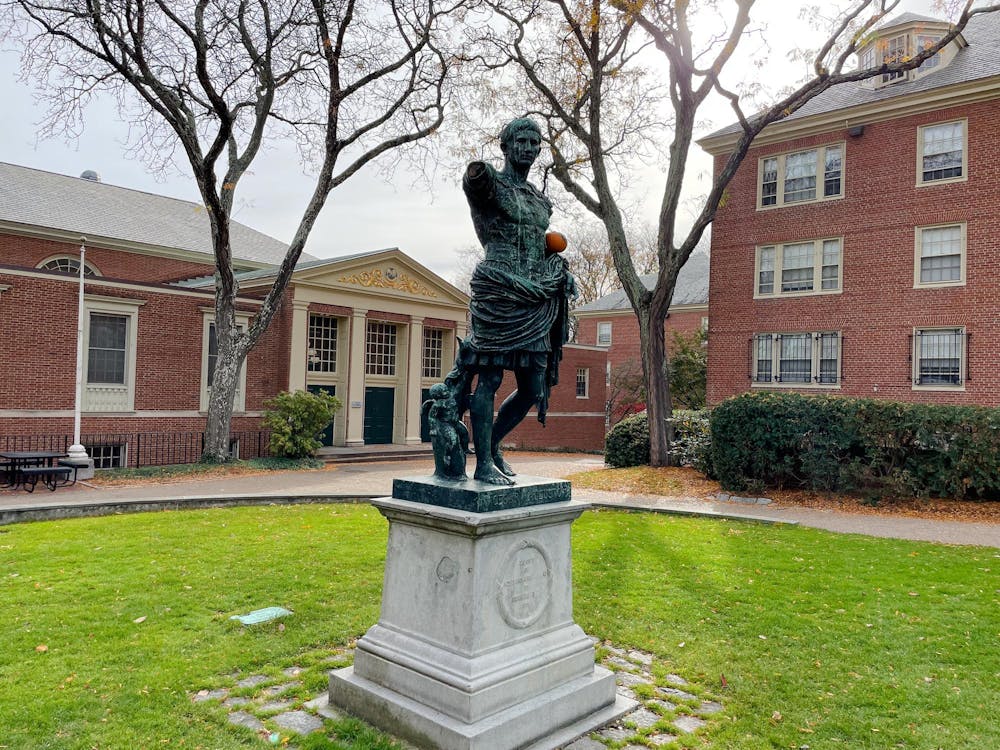In August 2022, staff at the University’s Investment Office contacted the student-run Brown Investment Group for a potential meeting. The purpose of the meeting, according to former BIG presidents Ian Becker ’24 and Ben Piekarz ’24, was “not completely clear” at the time.
When the pair arrived, they learned that hedge fund founder Steve Cohen P’08 P’16 “was interested in donating $100,000 to one of the investment groups at Brown,” Becker said.
“After a few meetings, Brown Investment Group was the one that won the bid,” Becker said — and BIG’s Long/Short Fund was born. Last March, it went public after months of planning, BIG leaders told The Herald.
The new fund — which, according to BIG’s website, is the “first ever student-run, university-endorsed long/short fund” — uses a combination of long and short positions to turn a profit. Investors take long positions by buying an asset in hopes of selling it later at a higher price. In contrast, an investor enters a short position by borrowing an asset and selling it at a certain price. If everything goes to plan, the price of the asset falls before it’s due back to the lender, allowing the investor to buy it back on the market at a lower price. The fund contrasts with BIG’s Core Fund, which relies exclusively on long positions over a longer time frame — typically five to 10 years — according to Piekarz.
Cohen, who endowed the fund, is founder of the hedge fund Point72. He’s also owner of the New York Mets and a former University trustee.
Cohen’s career has not been without controversy. In 2013, his former fund, SAC Capital Advisors, pleaded guilty to insider trading violations and paid a total of $1.8 billion in fines, The Herald previously reported. Cohen was not personally charged with any crimes.
In 2016, Cohen agreed to a two-year ban from supervising funds that manage outside money in a settlement with the Securities and Exchange Commission, following 2013 SEC charges that accused Cohen of failing to supervise a trader who was convicted of insider trading. In the settlement, Cohen neither admitted nor denied the SEC's finding.
Jean Horenstein, operating officer for investment and professional development at Point72 Academy — the hedge fund’s financial training program — played a key role in selecting the student groups that would win the $100,000. Horenstein spent months researching “the top 20 student investment funds in the country,” she said, examining each fund’s curriculum, history and structure, among other factors.
“We picked Brown because we loved the rich history of training, the curriculum (and) the oversight,” Horenstein said. “The students are super creative … They’re incredibly involved in the current BIG core fund.”
Cohen endowed two other student-managed long/short funds comprising students at the University of California at Berkeley and the Massachusetts Institute of Technology, respectively, according to Horenstein. Unlike BIG, neither of those funds are affiliated with their respective institutions.
Horenstein said the funds were selected for similar reasons: students were “very engaged, very intelligent” and “super interested in finance.”
“We felt like we could provide … experiential learning,” she added.
Piekarz noted that BIG’s Core Fund “has pretty consistently outperformed the market.”
The Core Fund currently has a compound annual growth rate of 11%, according to Becker. In comparison, the S&P 500 — a stock market index commonly used as a benchmark for national market growth — has a compound annual growth rate of 9.8% in the same time period.
Aside from making a profit, BIG also seeks to educate its members in managing investments. The Core Fund allows students to learn “to build a diversified portfolio that can hopefully outperform the S&P 500,” Piekarz said.
The Long/Short Fund broadens BIG’s educational offerings. Investors strategically combine long and short strategies to insulate their portfolios from the volatility of the markets, Piekarz said. As a result, “students are now exposed to creating long and short theses,” he said. “That’s not something that you have with the Core Fund.”
BIG managers meet every other month with an advisory board composed of a member of the faculty at the University, an investment officer and Horenstein. The advisory board does not have veto power over student decisions, but it does require BIG to produce a quarterly letter that explains the positions they entered and analyzes the positions they currently hold or recently exited.
Aside from his previous tenure as a trustee, Cohen has other ties to the University. In 2009, Cohen’s family foundation donated $30 million to support undergraduate financial aid, according to a University press release. Within two years, the foundation had donated an additional $6.1 million. Two of Cohen’s children also graduated from Brown. And from 2016 to 2020, the Steven and Alexandra Cohen collection lent “Untitled (Lamp/Bear)” — also known as Blueno — to the University.
According to Horenstein, Cohen’s decision to endow a student hedge fund at Brown was independent of his existing University ties. “He wanted to be objective,” she said.
In granting the endowment, Cohen’s team stipulated that a portion of investment proceeds be “donated to a charity of (the students’) choice,” Horenstein said. “You have to give a certain portion of the proceeds — and do something with it — to be a productive member of society.”
Clarification: This article has been updated to include additional information about legal proceedings involving Steve Cohen.
Charlie Clynes was the managing editor of digital content on The Herald's 134th Editorial Board. Previously, he covered University Hall and the Graduate Labor Organization as a University News editor.





